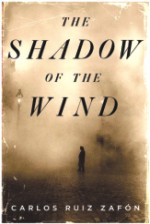|
Book Review
The Shadow of the Wind
Soraya Auer
 Published in 2001 'The Shadow of the Wind' is originally a Spanish novel. After years on the Spanish best-sellers list and huge popularity around Europe, the novel was translated into English by Lucia Graves (daughter of the British poet Robert Graves) in 2004. It has sold over a million copies in the UK alone and has been recently chosen as a “big read to make your holiday a success”. And without realising, that is exactly what I did; I bought Carlos Ruiz Zafón's 'The Shadow of the Wind' just before flying on holiday. Despite being an impressive 400 something pages, my companion assured me it was a great read. And great it was. Published in 2001 'The Shadow of the Wind' is originally a Spanish novel. After years on the Spanish best-sellers list and huge popularity around Europe, the novel was translated into English by Lucia Graves (daughter of the British poet Robert Graves) in 2004. It has sold over a million copies in the UK alone and has been recently chosen as a “big read to make your holiday a success”. And without realising, that is exactly what I did; I bought Carlos Ruiz Zafón's 'The Shadow of the Wind' just before flying on holiday. Despite being an impressive 400 something pages, my companion assured me it was a great read. And great it was.
The novel is set in post-Spanish Civil War Barcelona, and follows a young boy, Daniel Sempere, through a decade of suspense, mystery, love and drama. Just after the war, Daniel's father takes him to the secret Cemetery of Forgotten Books, a mausoleum for out-of-print works, salvaged by the bibliophiles of the city. According to tradition, everyone initiated to this secret place is allowed to take one book from it, and must protect it for life. Daniel selects a book called The Shadow of the Wind by Julián Carax. That night he takes the book home and reads it, completely engrossed. When he tries to investigate more about this unknown author, he finds that he has the last surviving copy, as a mysterious figure called Laín Coubert has dedicated himself to destroying Carax's remaining work completely. But, chillingly, Laín Coubert is the name of the Devil in Carax's book. Soon enough, this mysterious figure confronts and threatens Daniel. Terrified, Daniel returns the book to the Cemetery of Forgotten Books, but continues to pursue the story behind the elusive author, long presumed dead in a duel in a Parisian Cemetery.
As Daniel begins to piece together the secrets and tragedies that shadowed the author's life and work, he realises that his burning interest in Carax has earned him enemies and as the story unfolds, Daniel's life becomes intricately linked with Carax's, often paralleling it in mysterious and unsettling ways. It ultimately becomes clear that in trying to save Carax's work, Daniel is saving himself. What I found so remarkable was how the continuing suspense never dwindled or grew tiresome; if anything, the tragedy, the drama and the humour kept me gripped through the night.
Zafón convincingly conjures two worlds for the reader with the main setting as Daniel's Barcelona, gothic and dealing with its post-war dictatorship. The second is Julián's pre-war world, where aristocracy and family honour was paramount. Complexity is present in all aspects of the narrative as no character is two-dimensional and no scenery half-heartedly depicted. In the portrayal of the police there is quite literally a Good cop-Bad cop, with the satanic, psychopathic Inspector Fumero contrasted to Officer Palacios, who is revealed towards the end of the novel to be decent and well-meaning.
So much more could be said about the layers of this novel as it touches upon every genre; mystery, romance, thriller and period epic and comes together so artistically as a piece of literature. Some readers may find some moments sensational with the doomed love and gruesome murders, but Zafrón's masterful use of language and intricate plotting is without a doubt commendable. It is therefore incredible to think that nothing seems to be lost in the translation by Lucia Graves. To her credit, the language and atmosphere remains complex and captivating. I still vividly recall the chilling description of Laín Coubert when he faces Daniel in the streets. The language is smooth while the plot twists and untangles with languid grace. The Shadow of the Wind is ultimately more than a book about a book; it is for those as passionate about storytelling as its young hero and this clearly comes through with its gripping and tragic narrative.
Daniel sums up Zafón's novel best with “This is a story… about accursed books, about the man who wrote them, about a character who broke out of the pages of a novel so that he could burn it, about a betrayal and a lost friendship. It's a story of love and of the dreams that live in the shadow of the wind”. Before anyone thinks to pick up Zafón's upcoming novel 'The Angel's Game', set in a similar gothic Barcelona and to be published in early 2009, 'The Shadow of the Wind' is an essential read for the passionate and the imaginative readers out there.
Copyright
(R) thedailystar.net 2008
|
|
